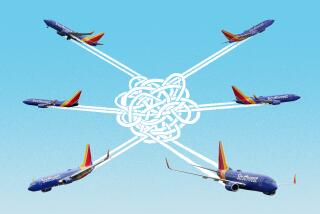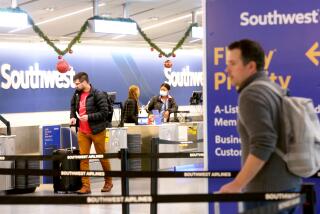TWA Withholds $75.5 Million in Debt Payments : Airlines: It is trying to save cash in the face of a big drop in bookings and high fuel costs.
- Share via
NEW YORK — In what some analysts say puts it one step closer to financial collapse, Trans World Airlines said Friday that it was withholding payments of about $75.5 million due on some of its debt because it must preserve cash in the face of a big drop in passenger bookings and high fuel costs.
“While I am troubled by the need to withhold payment from certain of our creditors, I believe it is imperative for the survival of TWA,” Chairman Carl C. Icahn said in a statement.
The airline, which blamed the Persian Gulf War for most of its problems, vehemently denied that it intends to seek protection from creditors under Chapter 11 of the bankruptcy code.
“TWA has absolutely no intention of seeking the protection of bankruptcy court,” Mark Buckstein, its general counsel, said in a statement. He added in a telephone interview that “we are optimistic that this is not a fatal step for TWA.”
After the announcement, Moody’s Investors Service Inc. downgraded its ratings on TWA debt. About $1 billion in long-term debt and $99 million in preferred stock were affected.
Only two weeks ago, TWA dramatically slashed its flights to Europe and said it was laying off about 3,000 employees because of the Gulf crisis.
“The war in the Middle East has precipitated a 60% drop in bookings over last year,” Icahn said Friday. “It is now apparent that, due to the war, summer vacation travel will be at its worst level in decades. This further compounds the deleterious effects of high fuel costs, a falloff in leisure and business travel resulting from the recession and fare wars that have affected the entire industry.”
The drastic action by TWA is the latest example of a string of financial disasters that have befallen the nation’s weaker airlines. Continental Airlines and Pan American World Airways have filed for Chapter 11 bankruptcy protection in recent months. Earlier this month, Eastern Airlines, which had been in Chapter 11 proceedings for nearly two years, was forced to cease operations.
Industry analysts have predicted that the bloodletting won’t stop until as many as half a dozen carriers cease to exist, either by reorganization, liquidation or merger with a stronger airline. The Air Transportation Assn. said recently that the nation’s airlines lost more than $2 billion in 1990--more than double any previous year.
TWA said that, as of close of business Thursday, it had about $200 million in cash on hand, including $110 million that American Airlines paid for TWA’s Chicago-to-London routes. That transaction, which had been awaiting U.S. government approval for about a year, was completed Thursday. TWA has also applied to sell its remaining London routes to American. That sale is awaiting approval of the U. S. Department of Transportation.
TWA, which is 90% owned by Icahn and 10% by its employees, said it will continue to pay all trade debts and other obligations and will continue all its foreign and domestic operations .
Ray Neidl, an analyst with Dillon, Read & Co., said the delayed payments were on bonds as well as private loans. “It is logical that they are doing this,” he said. “In light of what is happening to overseas travel, you should conserve your capital because you don’t know when this thing is going to turn around.” Neidl said Icahn was “restructuring without filing for Chapter 11.”
Paul Karos, an analyst with First Boston Corp., said a TWA Chapter 11 is “not imminent” if the sale of the remaining London routes is completed soon. But if the $410-million sale “is delayed very much--perhaps into late March or April--then Chapter 11 is a very high risk,” he added.
Once TWA gets U.S. government approval, it faces another stumbling block. Currently, Great Britain will not allow TWA to automatically transfer its right to land at London’s congested Heathrow Airport to American. The British stance also affects Pan Am, whose sale of its London routes to United Airlines is pending. Neither of the route purchasers wants to be forced to land at London’s Gatwick Airport, which is less congested but not convenient to downtown London and does not have as many European connections.
Negotiations between U. S. and British government officials over transfer rights broke down this week.
Transportation Secretary Samuel K. Skinner said after the talks broke down that Pan Am and TWA would have to be liquidated if the Heathrow squabble is not settled quickly.
Hans J. Plickert, airline analyst with Transportation Group, an affiliate of Paine Webber Inc., said Icahn’s true intentions might be “to put a little more pressure on the Department of Transportation” to give approval to the route sale and to push the British to agree.
More to Read
Inside the business of entertainment
The Wide Shot brings you news, analysis and insights on everything from streaming wars to production — and what it all means for the future.
You may occasionally receive promotional content from the Los Angeles Times.










